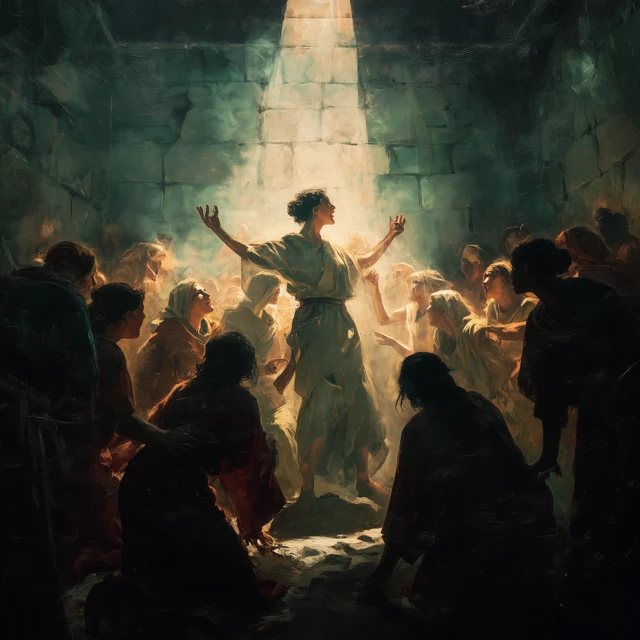At GanTV.com, we boldly affirm and celebrate women—your value, your voice, and your sacred call to preach the good news. In many evangelical traditions, objections to women preaching have been raised, often rooted in isolated interpretations of certain biblical texts. Yet when we step into the full, radiant light of the New Covenant and the early church’s patristic witness, a very different picture emerges. This week, we invite you into a deeper exploration of this vital question: What does the Bible truly say about women preaching?
We will not seek to exhaust every angle, but we will faithfully examine a couple of key Scriptures in their historical and linguistic context, through the lens of Christ’s finished work. Along the way, we’ll also highlight the extraordinary story of a woman whose encounter with Jesus ignited a legacy of bold, Spirit-led proclamation—one that still speaks today.
First and foremost, when exploring the question of women preaching, teaching, and leading within the Body of Christ, it’s crucial to begin where all sound theology should—in the person of Jesus Christ and the reality of New Creation. Christ is the full exegesis of God (John 1:18), and through Him, we understand all things—including how we view the call and vocation of women.
Contrary to much of what has been traditionally taught in the evangelical church, the Bible does not universally prohibit women from preaching or leading. In fact, it reveals the opposite: a progressive and radical lifting of women from cultural subjugation into full co-laboring partnership in the Gospel.
Rather than cherry-picking isolated verses through a modern Western lens, we must read scripture through the original languages, cultural setting, and the revelation of Christ—as the early church fathers and mothers often did.
Jesus and the Elevation of Women
We cannot talk about woman in ministry without looking at Jesus and how he viewed them. Throughout His earthly ministry, Jesus consistently upended the patriarchal norms of His day:
- He spoke directly and theologically with women (John 4, Luke 10:38–42).
- He allowed women to travel with and financially support His ministry (Luke 8:1–3).
- He entrusted the first announcement of His resurrection—the cornerstone event of Christianity—to a woman, Mary Magdalene (John 20:11–18).
- In sending her to the disciples, He commissioned her as the first “apostle to the apostles.”
In Christ, it is clearly lived out by our Savior himself, that gender distinctions no longer determine spiritual authority or value.
Early Church Witness: Women in Ministry
The early church recognized this radical new reality, even if later traditions obscured it. The early church included women in leadership roles far more frequently than many realize:
- Priscilla (with her husband Aquila) taught Apollos, a mighty preacher of the Word (Acts 18:26).
- Phoebe was a deacon (diakonos) of the church at Cenchreae and likely delivered Paul’s letter to the Romans herself (Romans 16:1–2).
- Junia was recognized by Paul as “outstanding among the apostles” (Romans 16:7), until later scribes masculinized her name in translations out of discomfort.
- Thecla, from the second-century Acts of Paul and Thecla, was revered in early Christianity as a preacher, teacher, and even a baptizer, highly honored by early patristic writers like Gregory of Nyssa and Methodius of Olympus.
The early church fathers, especially before the Constantinian institutionalization, often preserved these traditions of women preaching, prophesying, and teaching in the power of the Spirit. Many of them spoke notable quotes worthy of mentioning when it comes to the discussion of women and their equality.
Gregory of Nyssa (4th century)
“She undertook man’s work while remaining in the nature of a woman, being strengthened by divine power.”
(On Virginity, Chapter 3)
Clement of Alexandria (2nd century)
“The Word calls the woman who is engaged in salvation and who has received the same instructions as the man, perfect and equal to the man.”
(Stromata, Book 4, Chapter 8)
Origen (3rd century)
“The women are instructed to prophesy and to teach, so long as they do so with reverence and propriety.”
(Commentary on 1 Corinthians, Fragment 74)
Tertullian (early 3rd century)
“The Creator’s grace has given women also the gift of prophecy, teaching, healing, and miraculous powers.”
(On the Veiling of Virgins, Chapter 9)
This is simply a sampling but distinctly calls out how the earliest Christian communities, closer to the apostolic witness, saw women. Not as second class citizens or sidelined figures but as Spirit-empowered ministers—proclaiming, teaching, healing, and standing boldly in the light of the New Creation.
When we silence women today, we silence part of the early church’s radiant testimony.
Misunderstood Scriptures: Context is Everything
Let us now turn our focus on two commonly cited passages that are frequently weaponized to suppress women’s voices:
1 Timothy 2:11–12
“Let a woman learn in silence with full submission. I permit no woman to teach or to have authority over a man; she is to keep silent.”
What is the context? Paul was addressing specific false teachings in Ephesus, a city dominated by the Artemis cult, where women were priestesses and often spread heresies. Then there is the translation of a key word used. The Greek word translated as “authority” is authentein—an extremely rare word that implies domineering or controlling in a destructive way, not healthy, Christlike leadership. In this passage, Paul was correcting abusive domination, not banning woman from Spirit-led teaching. He was certainly not silencing them.
It is also important to highlight that Paul says “Let a woman learn”—a radical statement for a first-century Jewish man. Because clearly Paul is calling women; they were being invited into discipleship, and not exclusion.
1 Corinthians 14:34
“Women should be silent in the churches. For they are not permitted to speak, but should be subordinate, as the law also says.”
What is the context? This seems contradictory to 1 Corinthians 11, where women were encouraged to pray and prophesy aloud, provided they did so respectfully. So which is it?
Many scholars believe these verses were either a quotation Paul is refuting or a later marginal gloss added by scribes who were uncomfortable with women speaking in public worship. (In some early manuscripts, these verses are moved around, showing textual instability.) Paul’s consistent message throughout the Corinthian letters would points to orderly worship, not gender-based silencing of women.
The New Creation
We live in a new creation reality. And in the new covenant, all ministry is rooted in the Spirit, not the flesh—where there is not male, not female, not hierarchy, but Christ is all and all and love and mutuality is of high integrity in the church.
“In the last days, God says, I will pour out my Spirit on all people. Your sons and daughters will prophesy…”
— Acts 2:17 / Joel 2:28
Clearly, preaching and teaching are not based on what gender you are, but on the anointing of the Spirit who makes no distinction. The question to us shouldn’t be “can a woman preach?” But in the new creation, the real question is: If the risen Christ commissions her, who are we to say otherwise?
If the Spirit pours out gifts without distinction, and the Father calls daughters and sons alike to herald the good news, then to silence half the Body is to hinder the full manifestation of Christ’s life among us. In the new covenant, new creation reality the Apostle Paul writes, “There is neither Jew nor Greek, slave nor free, male nor female, for you are all one in Christ Jesus.”
— Galatians 3:28
And let us also be reminded of these facts.
Women preached at the empty tomb.
Women preached to the apostles.
Women preached in the early church.
And today, women still arise—not from the authority of human tradition, but from the authority of the Crucified and Risen Lord.

The Samaritan Woman: Apostle of Living Water
One of the most profound females and life testimonies to Christ’s radical elevation of women is found in the story of the Samaritan woman at the well in John 4.
This woman, often misunderstood and mischaracterized in Western interpretations, was not a sinful outcast but she was a chosen vessel who encountered Jesus intimately. It was in this encounter that Jesus released a powerful revelation—and an apostolic calling.
What is Her Her Name? Photini
She had a name. In the early church tradition, the Samaritan woman was known by name: Photini (also spelled Photina or Photine), which means “the enlightened one” or “the luminous one.”Her story didn’t end at the well. According to early Christian writings and traditions, especially in the Synaxarion and other patristic sources:
- Photini became a bold evangelist, proclaiming Christ far beyond her hometown.
- She eventually traveled to Carthage, and later to Rome, where she was imprisoned under Emperor Nero.
- Even in prison, she continued to convert fellow prisoners and members of Nero’s own household, including his daughter Domnina and the captain of the guard.
- Tradition holds that she willingly drank poison without fear, trusting in the Life of Christ within her, and emerged unharmed—confounding her persecutors.
Her intimate knowing of Jesus Christ made her fearless, even unto martyrdom.
A Misunderstood Past: Five Husbands
Many modern sermons portray Photini as an immoral woman based on her having had five husbands. But did you know these important facts? In the cultural context of first-century Samaria:
- Women could not initiate divorce—only men could.
- Multiple marriages often indicated tragedy: widowhood, abandonment, or being treated as disposable in a deeply patriarchal system.
- Each marriage could have been one of survival, and nothing to do with our modern day scandalous narrative about a woman who slept around or lived a life of shame.
It is important to note that Jesus did not condemn her. Instead, He revealed her story to her with tenderness and prophetic knowledge—He spoke of her never thirsting again that He was to be her living water and never once shamed her. He spoke to her identity in love that pierced through all the religious programming that held her captive.
He saw her. He knew her. And He called her.
Apostle to the Samaritans
After encountering Jesus, Photini immediately went out to tell the world about “a Man who knew everything about her” and became an the very first evangelist:
“Then, leaving her water jar, the woman went back to the town and said to the people, ‘Come, see a man who told me everything I ever did. Could this be the Messiah?'”
— John 4:28–29
Because of her bold witness, many in her city believed (John 4:39). And she preached not just to women, but to the entire community—men and women alike—bringing the good news of the Messiah, Jesus Christ. She was also among the very first to embody the reality of Acts 2: Sons and daughters prophesying, filled with the Spirit.
Legacy of Courage and Illumination
Photini’s life reminds us:
- Jesus reveals Himself fully to those we consider the unwanted ones, the outsiders.
- True evangelism flows from a heart intimately known by Christ and releases His life to others.
- Women have always been commissioned to bear witness to the resurrection life, it was woman who first witnessed Christ’s resurrection.
Through Photini, we see the New Creation breaking forth—where gender, ethnicity, and social status no longer determine worth or calling, only Jesus does. Her life is a living testimony that Christ’s living water cannot be bottled up in manmade religious systems. It flows where it will—and it flows through whomever He calls.
Photini, the Biblical story of the woman at the well was not merely a recipient of His grace—but in experiencing the living God, she became a radiant bearer of it. May we too drink deeply of the living water, and arise in the fearless knowing of our Beloved Christ, as Photini did—full of light, life, and divine boldness.

Drink Deeply Ladies—Arise Boldly
From the Garden to the Gospel, the Spirit has been inviting humanity to feast not on the tree of judgment and separation, but on the Tree of Life—Christ Himself.
In Christ, there is no left or right.
There is no Jew or Greek.
There is no male or female.
There is only new creation,
only union,
only the unveiling of the One who is all and in all (Colossians 3:11).
Mary Magdalene preached the resurrection. Photini preached living water. Phoebe, Priscilla, Junia, Thecla—all bore the apostolic heartbeat of the Gospel. The Spirit of the Lord has been poured out on all flesh, and the rivers of living water are already flowing. To silence a daughter is to quench part of the river. To release her is to let the fullness of Christ’s life flood the earth.
In Christ, we believe the question has never been whether women can preach, teach, or lead. The real question has always been:
Are we willing to believe the witness of Jesus Christ himself, the women He called, the woman He protected, the woman He emboldened, the women He changed, the women He revealed true identity to. He is the Tree of Life and will we as the body of Christ, the church at large, lay down the traditions of patriarchy and let the Spirit blow where He wills?
Arise, daughters of the Living God.
Drink deeply of His love.
Speak boldly of His goodness.
You are the radiance of His heart,
and you are called for such a time as this.
Selah!
GAN TV Programming Featuring Female Hosts:
—This is by no means a full list. Check out Gantv.com for more dynamic woman in ministry.
-
Exposed: Rooted in Love with host Nicole Potter
-
Perspectives with Catherine Toon
-
A New Day with Donna Reiners and Dr. Kami
We also recommend The Jesus Trip with John Crowder Episode: Woman in Ministry
✨ Source References by Topic
Jesus and Women: Elevation, Discipleship, Ministry
- John 4:1–42 — The Samaritan woman at the well; deep theological discussion, and her evangelism afterward.
- Luke 8:1–3 — Women (Mary Magdalene, Joanna, Susanna) traveled with and financially supported Jesus’ ministry.
- John 20:11–18 — Jesus appears first to Mary Magdalene and commissions her to announce the resurrection (“apostle to the apostles”).
- Luke 10:38–42 — Mary of Bethany sitting at Jesus’ feet as a disciple.
Scholarly Support:
- N.T. Wright, Surprised by Hope, chapter on resurrection appearances. 👉 Click here to buy now.
- Craig Keener, Paul, Women, and Wives (context of women in ministry during Jesus’ time). 👉 Click here to buy now.
Paul’s Affirmation of Women in Ministry
- Galatians 3:28 — “There is neither Jew nor Greek… male nor female… you are all one in Christ Jesus.”
- Acts 18:26 — Priscilla (with Aquila) teaches Apollos.
- Romans 16:1–2 — Phoebe, called a “deacon” (diakonos) and patron.
- Romans 16:7 — Junia, noted as “outstanding among the apostles.”
- 1 Corinthians 11:5 — Women were praying and prophesying in the gathered assembly.
Scholarly Support:
- Scot McKnight, Junia Is Not Alone (explores Junia’s apostleship).
- Ben Witherington III, Women and the Genesis of Christianity.
The Story of Photini (The Samaritan Woman)
- Early Church Tradition:
- Name “Photini” (or “Photine”) and her missionary activity comes from Orthodox Christian tradition, recorded in the Synaxarion (Orthodox Lives of the Saints) and expanded in traditions surrounding her martyrdom under Nero.
- Cited by early Eastern fathers and church historians.
Primary Traditional Sources:
- The Great Synaxarion (Orthodox Church calendar and history).
- The Lives of the Saints (Eastern Orthodox collections).
Patristic Writers:
- Saint Photini is honored in Greek Orthodox, Russian Orthodox, and other Eastern traditions as an “Equal-to-the-Apostles.”
- Gregory of Nyssa references “those who through boldness and martyrdom confess Christ,” linked to traditions like Photini’s.
Misunderstood Scriptures (Context Matters)
- 1 Timothy 2:11–12:Context of Ephesus and the Artemis cult (female-dominated religious leadership).
- Authentein — rare Greek verb meaning “to domineer abusively” (not simply “to have authority”).
- Scholarly Greek Lexicons: Louw-Nida, BDAG.
- 1 Corinthians 14:34–35:Debate over whether this was Paul quoting a Corinthian view he refutes.
- Evidence of textual instability (these verses appear in different places in different manuscripts).
- Some early manuscripts move these verses, suggesting they were marginal notes inserted later.
Scholarly Support:
- Philip B. Payne, Man and Woman, One in Christ (especially on 1 Corinthians 14 and manuscript traditions).
- Gordon Fee, The First Epistle to the Corinthians (New International Commentary).
Early Church Examples: Women in Ministry Beyond the New Testament
- Thecla — Heroine of The Acts of Paul and Thecla, a second-century Christian text.
- Honored by early church fathers:
- Gregory of Nyssa
- Methodius of Olympus
- Tertullian acknowledges its widespread influence (even if critical).
- Honored by early church fathers:
Primary Early Sources:
- The Acts of Paul and Thecla (second century, not canonized but widely respected). 👉 Click here to read now.
- Referenced in writings by early Christian authors.
New Creation Lens (Outpouring of the Spirit)
- Acts 2:17 / Joel 2:28 — “In the last days, I will pour out my Spirit on all flesh… sons and daughters will prophesy.”
- Colossians 3:11 — “Christ is all, and is in all.”
- 2 Corinthians 3:6 — “The letter kills, but the Spirit gives life.”
Theological Support:
- T.F. Torrance, Incarnation: The Person and Life of Christ (the new creation as the real context for all ecclesial activity).
- Early fathers (Irenaeus, Gregory of Nazianzus) emphasized Spirit-led equality and new humanity in Christ.













